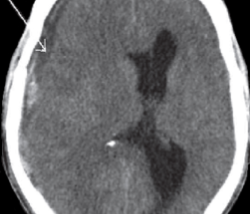Medrol can cause very nasty side effects like psychosis — called steroid psychosis.
And it’s not uncommon for ER physicians to see this.
My mother’s neurosurgeon said “one percent,” and then “half of one percent,” while in the surgery prep area where mother was being prepped for evacuation of a chronic subdural hematoma.
This was a recurrence of the chronic subdural hematoma, and the neurosurgeon had prescribed the Medrol Dosepak.
He never mentioned the possibility of mental side effects, though the insert mentioned them. He did mention, however, that constipation could result.
Several hours after taking her first Medrol tablets, my mother became a raving, delirious stranger, highly agitated, and had lost all rational thought processes.
My father asked if this could be a side effect of the steroid, and I said, “No, steroids don’t cause these kinds of side effects.”
I thought that the ranting, bouts of crying, complaints of being unable to breathe, and general delirium, were from a recurrence of the chronic subdural hematoma, with some panic attack mixed in (my mother has a history of panic attacks).
After all, she had already been experiencing two other symptoms that were obviously from a recurrence (and later confirmed via CAT scan) of the chronic subdural hematoma: searing headaches that increased in frequency, and deterioration of fine motor control in her left hand.
So my mind, then, was locked on the conclusion that the rapid-onset madness was yet another symptom of a recurring chronic subdural hematoma.
In the ER, the doctor suspected steroid psychosis from the Medrol, but couldn’t rule out a recurrence of the chronic subdural hematoma until the CAT scan results were in.
The CAT scan showed nothing that could explain such behavior, and the doctor diagnosed her with a bad reaction to the Medrol, known as steroid psychosis.
Steroid psychosis is not the same as “roid rage.”
There are two kinds of steroids: anabolic and catabolic.
Anabolic steroids are what athletes use, to build muscle (anabolism). Corticosteroid drugs, used to control or bring down inflammation, are catabolic (promote muscle breakdown), and often cause fat gain.
The ER doctor said she sees steroid psychosis often, but also said it’s not common.
The neurosurgeon, of course, said that steroid psychosis occurs in one percent, and one-half of a percent, in patients.
Interestingly, my mother tolerates Cymbalta and Effexor beautifully, and antidepressants are notorious for causing a myriad of intolerable side effects, but for my mother, Medrol was a horrible drug.
 Lorra Garrick has been covering medical, fitness and cybersecurity topics for many years, having written thousands of articles for print magazines and websites, including as a ghostwriter. She’s also a former ACE-certified personal trainer.
Lorra Garrick has been covering medical, fitness and cybersecurity topics for many years, having written thousands of articles for print magazines and websites, including as a ghostwriter. She’s also a former ACE-certified personal trainer.
.










































